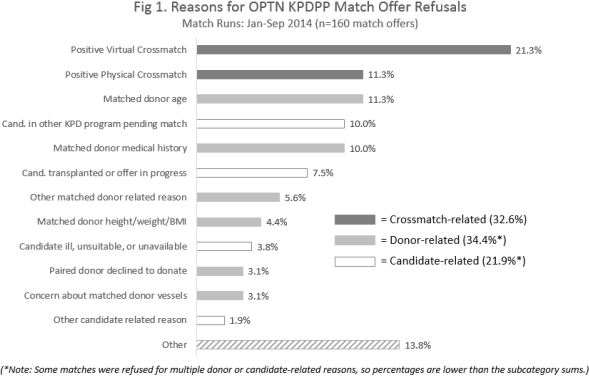Reasons for Match Offer Refusals and Efforts to Reduce Them in the OPTN/UNOS Kidney Paired Donation Pilot Program (KPDPP)
1UNOS, Richmond, VA
2Carnegie Mellon Univ, Pittsburgh, PA
3Univ Hosp Case Med Ctr, Cleveland, OH.
Meeting: 2015 American Transplant Congress
Abstract number: 466
Keywords: Alloantibodies, Highly-sensitized, Histocompatibility antigens, Kidney transplantation
Session Information
Session Name: Concurrent Session: Kidney: Living Donor Issues III
Session Type: Concurrent Session
Date: Tuesday, May 5, 2015
Session Time: 4:00pm-5:30pm
 Presentation Time: 5:00pm-5:12pm
Presentation Time: 5:00pm-5:12pm
Location: Terrace I-III
Background: The OPTN/UNOS KPDPP has been finding 2-way, 3-way, and chain exchanges since Oct 2010. Though the number of pairs entered, matches found, and transplants performed grew markedly in 2013-2014, the match failure rate remains stubbornly high, with only 8% of matches resulting in a transplant. The OPTN/UNOS Kidney Transplantation Committee and KPD Work Group are exploring ways to improve match success rates and increase the number of transplants through KPD.
Methods: Using OPTN data, we analyzed the 332 match offers made by the KPDPP in Jan-Sep 2014 that did not result in transplant. Since some failed matches were refused due to multiple reasons, reported percentages do not sum to 100%. Repaired matches were excluded.
Results: 52% (n=172) of failed matches were actually accepted by the candidate's transplant hospital but could not proceed due to a refusal of another match in the exchange. In 12 cases, the candidate had a negative (or acceptable) crossmatch (XM) result. Of the remaining 48% (n=160) that were refused, 32.6% were due to XM-related issues, often involving candidate antibodies to DQB or DPB. 34.4% were concerns about the donor's age, medical history, or other donor factors. 21.9% involved candidate issues, most notably competing match offers from other KPD programs (Fig 1).
Conclusions: The failed KPDPP exchanges were most often due to donor specific antibodies, donor age or medical history, or a candidate having another transplant opportunity. Some declines were unavoidable; others (donor age, BMI, unacceptable antigens) may have been averted through more deliberate use of offer acceptance criteria or the donor pre-select tool. Efforts to reduce decline rates include investigating potentially avoidable refusals (e.g., survey to hospitals that report a XM-related refusal), optimizing the donor pre-select tool's effectiveness, and developing a comprehensive set of OPTN KPD histocompatibility requirements. We are also considering optimization algorithm changes such as failure-aware matching.
To cite this abstract in AMA style:
Leishman R, Stewart D, Kucheryavaya A, Callahan LRobbins, Sandholm T, Aeder M. Reasons for Match Offer Refusals and Efforts to Reduce Them in the OPTN/UNOS Kidney Paired Donation Pilot Program (KPDPP) [abstract]. Am J Transplant. 2015; 15 (suppl 3). https://atcmeetingabstracts.com/abstract/reasons-for-match-offer-refusals-and-efforts-to-reduce-them-in-the-optnunos-kidney-paired-donation-pilot-program-kpdpp/. Accessed February 15, 2026.« Back to 2015 American Transplant Congress
